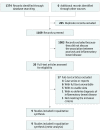Association of Psoriasis With Inflammatory Bowel Disease: A Systematic Review and Meta-analysis
- PMID: 30422277
- PMCID: PMC6583370
- DOI: 10.1001/jamadermatol.2018.3631
Association of Psoriasis With Inflammatory Bowel Disease: A Systematic Review and Meta-analysis
Abstract
Importance: Patients with psoriasis may experience comorbidities involving cardiovascular diseases, chronic kidney disease, uveitis, psychiatric disturbances, and metabolic syndrome. However, the association between psoriasis and inflammatory bowel disease (IBD) has been largely unclear.
Objective: To investigate the association of psoriasis with IBD.
Data sources: For this systematic review and meta-analysis, MEDLINE, Embase, and the Cochrane Central Register of Controlled Trials were searched for relevant studies from inception to January 17, 2018.
Study selection: Case-control, cross-sectional, or cohort studies that examined either the odds or risk of IBD in patients with psoriasis were included. No geographic or language limitations were used in the search.
Data extraction and synthesis: The PRISMA and MOOSE guidelines were followed for data extraction. The Newcastle-Ottawa Scale was used to evaluate the risk of bias of included studies. Crohn disease and ulcerative colitis were analyzed separately and random-effects model meta-analysis was conducted. A subgroup analysis was performed on psoriatic arthritis.
Main outcomes and measures: The risk and odds of IBD, Crohn disease, and ulcerative colitis in patients with psoriasis.
Results: A total of 5 case-control or cross-sectional studies and 4 cohort studies with 7 794 087 study participants were included. Significant associations were found between psoriasis and Crohn disease (odds ratio, 1.70; 95% CI, 1.20-2.40) and between psoriasis and ulcerative colitis (odds ratio, 1.75; 95% CI, 1.49-2.05). Patients with psoriasis had an increased risk of Crohn disease (risk ratio, 2.53; 95% CI, 1.65-3.89) and ulcerative colitis (risk ratio, 1.71; 95% CI, 1.55-1.89).
Conclusions and relevance: These findings suggest that psoriasis is significantly associated with IBD. Gastroenterology consultation may be indicated when patients with psoriasis present with bowel symptoms.
Conflict of interest statement
Figures




